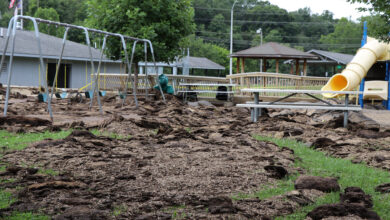N.C. Land & Water Fund Awards over $45 Million
 The North Carolina Land and Water Fund Board of Trustees met Sept. 19 and 20 to consider grant applications and make awards for projects that will protect North Carolina’s land and water from the mountains to the coast. With the newly enacted state budget, over $45 million will be available immediately to fund these projects.
The North Carolina Land and Water Fund Board of Trustees met Sept. 19 and 20 to consider grant applications and make awards for projects that will protect North Carolina’s land and water from the mountains to the coast. With the newly enacted state budget, over $45 million will be available immediately to fund these projects.
“Our natural areas, rivers and streams are critical to the health and well-being of North Carolinians and our economy,” said Governor Roy Cooper. “These grants will help protect our state’s land and wetlands for generations to come.”
The funds will protect 16,793 acres, over 14,000 of which will eventually be open to the public for hiking, hunting, boating, birding and other recreational uses. Funds were also granted for 13 projects to restore or enhance over 10 miles of streams, rivers, lakes, and estuaries and to restore over 7,000 acres of drained or otherwise impaired wetlands. Funds were awarded for two projects designed to evaluate innovative techniques for managing stormwater. In addition, 13 planning projects were funded to identify key water quality and conservation opportunities in mountain, piedmont and coastal watersheds.
Grants awarded will help protect 134 types of rare plants, animals, and natural communities. Conservation projects will benefit 27 Endangered or Threatened plants and animal species, including the Carolina Northern Flying Squirrel, Bog Turtle, Heller’s Blazing Star, White Irisette, and Red-cockaded Woodpecker. More than $19 million in grants will go to rural and economically distressed counties.
“In addition to protecting water quality, these state investments will conserve wildlife habitat, preserve historic and cultural sites, enhance quality of life, and increase recreation opportunities,” said Reid Wilson, secretary of the N.C. Department of Natural and Cultural Resources. “2023 is the official North Carolina ‘Year of the Trail’ and it is fitting that these projects will add to trails across the state, including new sections of the Mountains-to-Sea Trail, East Coast Greenway, and Deep River State Trail.”
This year’s grants will support North Carolina’s $28 billion outdoor recreation economy by:
• Protecting over 2,100 acres to be added to N.C. Wildlife Resources Commission game lands in Ashe and Scotland counties;
• Adding over 4,300 acres to N.C. State Parks in Avery, Chatham, Guilford, Iredell, Robeson, Rockingham, Transylvania, and Yancey counties;
• Protecting over 6,000 acres in local parks and preserves in Bertie, Buncombe, Carteret, Cherokee, Durham, Hertford, Johnston, Macon, New Hanover, Orange, Rutherford, and Wake counties;
• Protecting nine sites with historic and cultural resources, including Black Mountain College Historic District, Mount Helen Estates Historic District, Worrells Mill, Trail of Tears Tatham Gap Segment, and multiple archaeological sites, as well as buffering the Blue Ridge Parkway and Walnut Hill Rural Historic District;
• Improving over 18 miles of streams, rivers, and shores via living shoreline construction, stream and floodplain restoration, and dam removal projects, including a project on the Oconaluftee River that will reconnect 478 miles of river and streams, expanding habitat for the North Carolina threatened Sicklefin Redhorse, a species of cultural significance for the Cherokee;
• Funding 13 planning grants across North Carolina, including identifying threats to water supplies, stormwater management and stream restoration opportunities, and wetlands and floodplains capable of mitigating flooding. Communities and areas impacted include Boone, Biltmore Forest, the Lumbee Cultural Center, King’s Mountain, Greenville, Morganton, and Thomasville; and
• Funding two innovative stormwater projects designed to evaluate the effectiveness of novel stormwater treatment systems in Wilson and Craven counties.
North Carolina Land and Water Fund grants will also provide buffers for military installations and training areas, awarding $6.7 million and protecting over 6,200 acres near USAF Seymour Johnson, MCAS Cherry Point, U.S. Army Camp Mackall, U.S. Army Fort Liberty, and Military Ocean Terminal Sunny Point. The military sector contributes $66 billion in economic activity in the state each year.
“The board considered 114 outstanding applications from our conservation partners for a wide variety of great projects throughout the state, from removing a century-old dam and reconnecting a huge watershed in Swain County, to protecting almost 4,000 acres along the Northeast Cape Fear River for a new park just 10 miles from downtown Wilmington in New Hanover County,” said John Wilson, chair of the North Carolina Land and Water Fund board of trustees. “These exceptional projects, as well as smaller ones with enormous impact, are only possible due to recent increases in recurring annual budgets for the Land and Water Fund supported by Governor Cooper and the General Assembly.”
A complete list of grant awards is available on the NCLWF website at https://nclwf.nc.gov/2023-nclwf-awards






